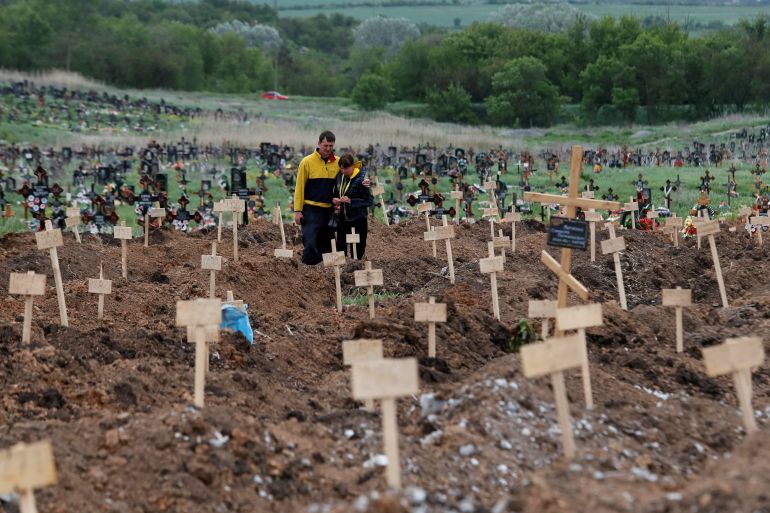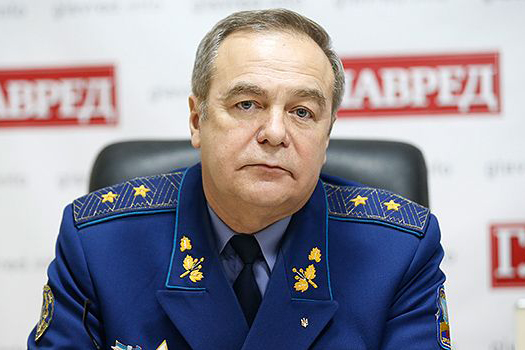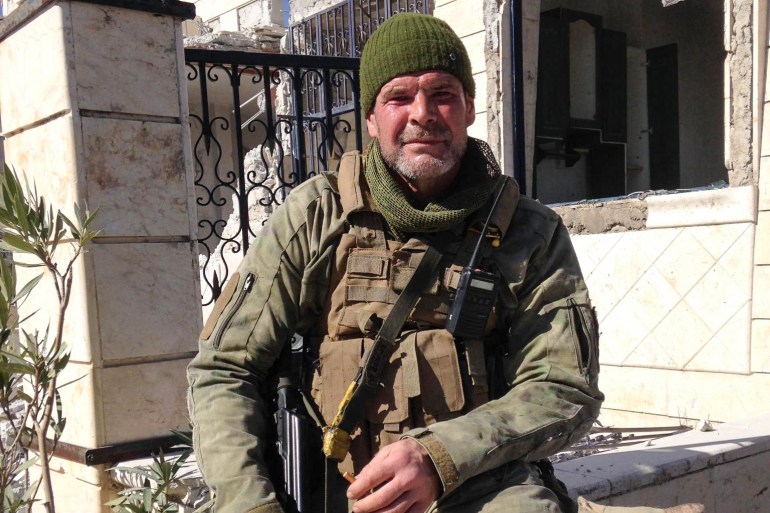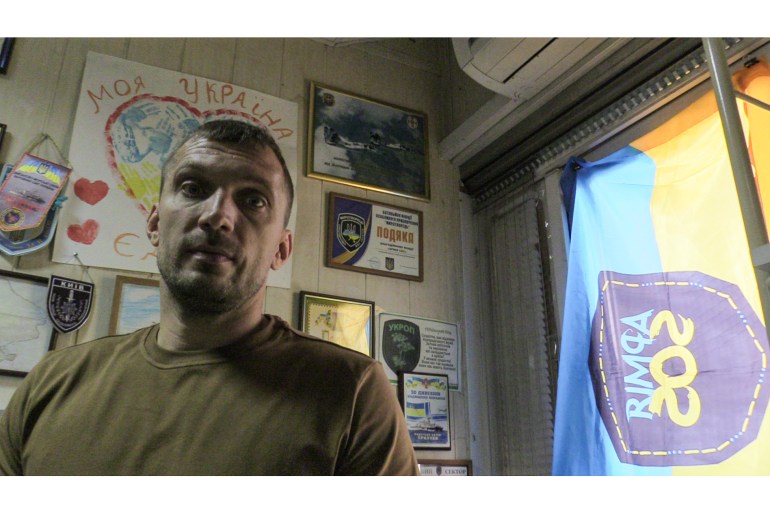Six months since Russia invaded Ukraine: What’s next?
Experts analyse the past six months and predict how the conflict may evolve.

Six months after Russian President Vladimir Putin began a full-scale invasion of Ukraine, several analysts and military experts reflect on the conflict and predict how the war may evolve.
‘They didn’t calculate that the West would consolidate around Ukraine’
Lieutenant General Ihor Romanenko, former deputy chief of the General Staff of the Ukrainian Armed Forces:
Keep reading
list of 4 itemsBanning Russians from Europe would be dangerous
Russia accuses Ukraine of ‘chemical terrorism’ using toxin
Zelenskyy warns Russia against ‘show trial’ of Ukrainian soldiers
“There is a new professional approach to manoeuvring and defence [of Ukraine’s armed forces]. Even though air defence systems, aviation, date back to the Soviet era and are somewhat modernised, their results are very high.

“Putin wanted to destroy our state, remove or kill our president, and conduct a ‘de-Nazification,’ i.e. destroy our nationhood. All of these strategic goals have not been achieved – and won’t be. The nation exists, the supreme commander [President Volodymyr Zelenskyy] is in place, he didn’t fly or run away, he is leading the resistance, and the armed forces are fulfilling duties quite professionally.”
“Their plans were to take Kyiv in three days and in seven all of Ukraine. They really pinned their hopes on the agents they bribed here, spent billions, according to international estimates.
“That’s why within a week [after the war started] it was clear they would fail. Within a month, [the Kremlin] started dismissals [of top brass in Russia], investigations within the FSB system, the Fifth Department [responsible for intelligence information on Ukraine], and then the FSB decided to blame the military for their mistakes, which triggered purges in the FSB and the armed forces.
“Firstly, [the Russians mistakenly] overestimated their armed forces. Secondly, they underestimated the power of the Ukrainian armed forces, the power of defence and the popular support. And thirdly, they didn’t calculate that the West would consolidate around Ukraine.”
‘Russia will lose’
Mariam Naiem, Ukrainian researcher:
“I don’t think anyone can predict the exact course of the war and when it will end. The experience of the early days when some Western analysts gave Kyiv three days to fall is a lesson. But one thing I know for sure is that eventually, Russia will lose.

“Here is why. Although some Western thinkers, especially those not familiar with Russian colonialism, argue otherwise, this war really is about Russian colonial reconquest. The unity of the ‘Little Russian’ (Ukrainian) and ‘Great Russian’ peoples have been central to the Russian chauvinist ideology for centuries. This ideology accepts limited political and economic independence of Ukraine as long as Ukraine exists within the ‘Russian world’.
“It fundamentally cannot accept cultural independence: Ukraine embracing our own language and culture. To the chauvinists in power in Russia, Ukraine’s rejection of the ‘Russian world’ is like the rejection of civilisation and turn to ‘barbarism’ and ‘savagery’, an insult to their belief of their culture’s superiority among Russian colonies.
“However, the full-scale invasion radically changed Ukrainian society like nothing else could. The longer the fight goes on, the deeper our decolonisation process goes. This is unavoidable: the engine has started and can only accelerate now. The severing of cultural ties with Russia started with Maidan in 2014 and will bloom fully into a restored Ukrainian identity. The Russian war aim of bringing Ukraine back to the ‘Russian world’ cannot happen any more.”
‘The military success the Russian leaders want is very doubtful’
Marat Gabidullin, an author and former mercenary with Russia’s private Wagner army who fought in Syria, but later fled to France:
“To a large extent, [the supplies of Western weapons] messed up the [Russian] rears, infrastructure, depots [and] command centres. It significantly decreased the amount of resources available for advance, decreased the drive for advance.

“These days, it looks like the [Russian] forces have lost steam. Now, they actively replenish the manpower, but they do it in ways to avoid a declaration of [general] mobilisation.
“The declaration of mobilisation is unacceptable for Russia’s leaders, because the true attitude of Russians towards the war will become obvious. They support [the war] as long as they don’t have to be involved. If you mobilise them, they will run away to the [Ukrainian] forests or will flee to Kazakhstan.
“That’s why [the Kremlin is] conducting a hidden mobilisation – to recreate a certain mass of servicemen without which ground operations are impossible.
“[The very idea of going to war with Ukraine is an] implementation of an apocalyptic scenario.
“This is complete madness. I knew from the very start that their hopes for an easy victory would not come true. There won’t be an easy victory.
“They hoped to [end the war] very quickly, that’s why they called it a ‘special operation’. And one could see from the very start that they got bogged down. They got stuck. Everything went against their scenario.
“And as the Ukrainian army gets new resources and conducts active mobilisation, the military success the Russian leaders want is very doubtful. Most likely, at a certain intermediate stage they will pretend that what they achieved was what they really wanted.”
‘Russia’s war in Ukraine has entered a war of attrition’
Melinda Haring, deputy director of the Atlantic Council’s Eurasia Center:
“Russia’s war in Ukraine has entered a war of attrition. Neither side has the manpower (Russia) nor the weapons (Ukraine) to deliver the knockout punch.

“All eyes are focused on the south and the nuclear power plant that Putin has taken hostage. Ukraine announced that it would retake the city of Kherson but it hasn’t really begun a major counteroffensive there.
“It has begun to strike Crimea aggressively and sow uncertainty in what was once a peaceful peninsula. Both sides are bogged down in the Donbas.
“If the West continues to provide Ukraine with the weapons that it needs, if the strong coalition in the West holds throughout the winter and the Germans don’t cave, and if the EU finally delivers on the promised budgetary support to maintain Ukraine’s schools, hospitals and state services, Ukraine’s got a real shot at an eventual victory.
“It will be an impossibly long slog, but Kyiv has the will to make it happen.”
‘Their advance is insignificant’
Oleksiy Savchenko, a co-founder of the Army SOS volunteer organisation that developed software for correcting artillery fire and supplied thousands of tablets and cellphones to the Ukrainian military:
“They (Russian forces) seized a large part of Ukraine, a significant one, they really damaged our economy, because the war is being waged on our territory.

“But as to their failures – they didn’t do a tenth of what they had planned, they still haven’t seized the Luhansk region, there are two villages still under our control there. The [Ukrainian-controlled part of the] Donetsk region has the same borders, their advance is insignificant, and it is being liberated.
“They have united the Western community like never before – the West is united and gives us weapons, slowly, not the way we want, but they’re giving us [the arms] we had not negotiated six months before.
“And Finland with Sweden [will be] in NATO. The pretext for the invasion of Ukraine was that Ukraine is being dragged into NATO, and now they have NATO next to Saint Petersburg [Putin’s hometown].”
‘We are entering the most difficult period of the war’
Tatsiana Kulakevich, researcher on Eastern Europe born and raised in Belarus, currently at the University of South Florida:
“Russia did not count on a long-lasting war and still calls it the ‘special military operation’. The state of the military is not the same as during the first days of the invasion. Russia is experiencing a shortage of trained and motivated infantry, the quality of personnel training is gradually declining. However, even with bad quality reserves and older equipment, Russia is a heavy machine.

“Western support, especially heavy artillery like, for example, High Mobility Artillery Rocket System (HIMARS), has been critical for Ukrainian military forces. More equipment is eagerly expected by Ukraine.
“The expectations are that Russia will organise provocations to discredit Ukraine on its Independence Day, on August 24.
“We are entering the most difficult period of the war – positional warfare, when there is no movement dynamics. Russia will be making efforts to prevent the Ukrainian counteroffensive. Ukraine will be preventing Russia’s forces from getting deeper into Ukrainian territory and waiting for more heavy weapons to arrive from the West.
“[Meanwhile, Belarusian President Alexander Lukashenko] cannot afford to send its army to Ukraine. He cannot trust his soldiers won’t defect while on Ukrainian territory. He also heavily relies on law enforcement to maintain his power, especially after massive protests in Belarus in 2020. Instead, the Belarusian government has been giving its military supplies – ammunition (whereby equipment from long-term storage is removed and given away) – to the Russian Federation.
“Ukraine is determined to only start peace talks after Russia removes its forces to the borders that existed on February 24, 2022.”
‘Ukraine has no forces and resources to cardinally change the situation’
Ihar Tyshkevich, a Kyiv-based analyst:
“Generally, there is a stalemate. Russia can’t achieve any impressive success to force Ukraine to start ceasefire talks from the position of a losing side, and to show the [Russian] public a victory.
“On the other hand, for now, Ukraine has no forces and resources to cardinally change the situation without huge losses of manpower. In terms of the death toll, Ukraine is in a worse position because its public is more open and more sensitive to the number [of victims].
“These days, Russia is desperate to show success in the Donetsk region and to keep control of [the southern region of] Kherson.
“As of 2012, 2013, [Moscow] started calling Ukraine a ‘failed state,’ and presented the Russian army as the only battle-ready force in the region. So, the only battle-ready force in the region tried to attack a failed state. And instead of three days [to seize Kyiv] we’re talking about a stalemate in six months.
“It means that even Russia’s closest allies don’t consider the Russian army that invincible. In the Spring, Russia’s allies, partners were unexpectedly shocked by the fact that Russia was not winning fast, but now, every new failure of Russia keeps destroying the image of Russia and its armed forces.
“The war has entered a prolonged phase, and a competition of economies is going on, whose economy will start shrinking first. Ukraine’s economy is weaker than Russia’s, but in this case, what’s important for Ukraine is the existing foreign support.”
‘You can expect a longer frontline’
Alissa de Carbonnel, deputy programme director for Europe and Central Asia with the International Crisis Group, a Brussels-based think tank:
“It’s really a story of over and underestimation on all sides – [for instance] the way in which the West viewed Russia and Russians, and Putin’s ambitions.
“Putin’s ambition is to go as far as possible, to decapitate the government in Kyiv. From the Russian side, the story of underestimation is that, obviously, the conflict was a lot harder and more brutal and more difficult than expected.
“People underestimated Zelenskyy’s strength as the president, his ability to unite people, the resilience of people, the way in which society has changed.
“Even the West itself underestimated the amount of support that they were willing to give Ukraine even if it has been gradual, even if there are questions about the deliveries [of weapons], the continuing unity, and solidarity in the long term as we start to see the beginning of an economic recession [in Ukraine].
“I am afraid that neither side has the capabilities – financially and in terms of manpower – of keeping the fighting going at this intensity for years.
“But if we project it ahead for six months and we know how grinding things have been, you can expect a longer frontline with periodic escalations across that frontline. Unfortunately, I don’t think we will see an end to fighting after [another] six months.”
‘Neighbouring countries should be wary of what’s next’
Valeriia Voshchevska, Ukrainian audience strategist and women’s rights activist based in London:
“Ukraine is holding on, and doing that quite well. We have the resilience and strength to carry on because we are protecting our own land and not just following the orders of some power-obsessed fascist dictator sitting in a bunker.

“Of course Western support is making a massive difference, but a key reason why Ukraine is holding on is the internal drive of many to expel the invaders from our territory. It’s harder for them because they don’t have that same motivation. I think they’ve realised how badly they messed up in the first few days of the invasion so I think they’ll go back to fighting how they did since 2014.
“The best analogy for Putin’s behaviour right now – is a person who’s in a casino at 3am. He’ll keep losing and keep wanting more – to ‘regain what he lost’. I think his failed attempt to seize Kyiv in the first few days of the invasion, the blowback from the international community paired with the crippling sanctions, the military losses as well as the mysterious explosions on the military bases – all make him psychologically operate in the ‘losses domain’.
“He’ll keep ‘playing’ until he can win back some of what he lost. All neighbouring countries should be wary of what’s next – because we’ve seen what can happen when you least expect it.”
‘Russia’s invasion of Ukraine is an imperialist restoration project’
Maria Popova, associate professor at McGill University in Montreal, Canada:
“Experts on Russia have known for a while, but perhaps more political leaders and the wider public have learned two main lessons: Firstly, Russia’s invasion of Ukraine is an imperialist restoration project, rooted in the belief that Ukraine is not a ‘real nation’ and does not deserve independent statehood; NATO expansion and security fears were a ruse that the Kremlin used to hide its true goals.
“Secondly, there is a lot of spin and little truth in politics, but the Kremlin is particularly untrustworthy as a diplomatic interlocutor – Russia has used lies and blackmail routinely to try to achieve its goals.
“The Ukrainian army has exceeded expectations and shown itself to be highly competent, nimble, and motivated. [Ukrainian President Volodymyr] Zelenskyy has also risen to the occasion and has proven to be a Churchillian wartime leader. His communication skills and his personal valour have not only inspired his compatriots, but have increased Ukrainian soft power on the world stage. While anyone with deep knowledge of Ukraine would have predicted that the country would fiercely resist Russia’s invasion, few would have predicted Ukrainian victory in this war, but it is now entirely plausible.”
‘We are witnessing a suicide of Russia’s political elites’
Pavel Luzin, a Russia-based analyst with the Jamestown Foundation, a think-tank in Washington, DC:
“In the past six months, we are witnessing a suicide of Russia’s political elites, and, probably, Russia as a state and as an actor in international relations. The rest is minute details, because it can no longer exist the way it was shaped in 1991 and after what it came to by early 2022.”
‘It’s only likely to get worse’
Ivar Dale, a senior policy adviser with the Norwegian Helsinki Committee, a rights watchdog:
“From a human rights perspective, indeed from any perspective, six months of war have brought tragedies and atrocities on a scale we simply could not have imagined. With so-called ‘tribunals’ of Ukrainian prisoners in the ruins of Mariupol planned, it’s only likely to get worse. Putin’s war has torn apart Russians and Ukrainians in a way that disagreements about European integration never could have. But somewhere down the road, there must be justice for the victims, and a rebuilding of Ukraine must begin.
“The disregard for the suffering of ordinary Ukrainians is what has shocked me the most. The war has unveiled a level of cynicism in Russian society that is beyond what many expected. It is hard to fathom that so many people choose not to believe, or ignore, or even condone what Russian soldiers are doing.”
‘Ukrainians do not have enough resources to start a big offensive’
Oleg Ignatov, Russia-based analyst for Crisis Group:
“We see lots of reports that Russian soldiers and officers are not satisfied with how this war is going on. If we believe these reports, the Russian army is experiencing a lot of casualties. They still haven’t captured the Donbas region, which was one of their public goals. If they don’t take over Donbas, it will be a loss for Russia, and they will need to escalate which means declaring a mobilisation or restarting its offensive.

“The Ukrainians are very successful in destroying Russian infrastructure, supplies and command points in the occupied territories. That looks like a Ukrainian tactic right now, they’re hitting the Russians in the south, in Crimea. They want to create a situation where Russian commanders understand they need either more forces, or leave. Ukrainians do not have enough resources to start a big offensive. Another consideration is the Western countries which invested a lot of resources in Ukraine – the Ukrainians understand they need to show some results.
“Every side is waging an information war, so we should be very critical of what they’re saying in public. We don’t have good polls we can trust, so no one knows the real state of mind in Russia. Russia is a very big country and you can find all sorts of people who are ready to go and fight, but a majority are not ready for mobilisation. As for the economy, I think we will see all the negative effects of sanctions next year because Russia has a lot of resources.
“I don’t see any possibilities for peace on the horizon because both sides are pursuing opposite goals. They will be able to negotiate in the future if they experience heavy losses or when both sides understand they don’t have enough resources to continue waging this war.”
Editor’s note: Some of these interviews were lightly edited for clarity and brevity.